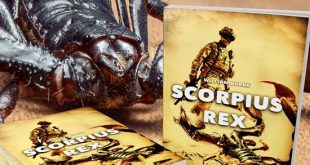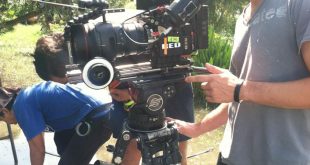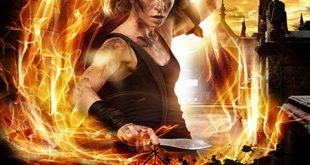Horrornews.net Exclusive Interview with Author of “Voodoo Child, Book One: Zombie Uprising”
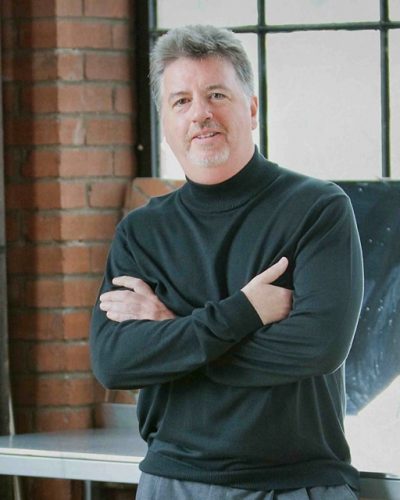 What authors inspire you to write horror?
What authors inspire you to write horror?
It’s funny but in terms of the horror genre films have influenced me more than books, probably because I’ve been a horror movie fanatic from early childhood. But I did read a lot of Stephen King in the seventies and eighties. Back then every teen with a taste for books was devouring his stuff. He’s an amazing writer who perfected the concept of horror stories that happened in your own backyard.
His characters drank the same beer, ate the same cereal and drove the same cars that our families did. It was a subtle but very powerful touch he added long before products actually started paying for that kind of exposure.
James Herbert particularly his first novel The Rats and its sequels Lair and Domain also influenced me.
Herbert is an underrated, visceral, punch you square in the guts kind of writer. The Fog along with its semi-sequel The Dark are also great examples of his talent. Right now I’m reviewing the film adaptation of his book The Survivor for Horrornews. Herbert called the film, “Pure rubbish,” but I’m trying not to let that influence me.
Another influence on Voodoo Child is the old men’s adventure paperbacks from my childhood, particularly The Destroyer series by Warren Murphy and Richard Sapir. Those books were really satires of the whole 1970’s testosterone-drenched adventure genre, blending action, science fiction and fantasy with the author’s twisted sense of humor. You have to be careful though because there are over 140 books in the series, but only about 50 are actually good. The dynamic of Maggie and Sarafina owes a debt to those books.
Other than that I really admire writers like Harry Crews, Jim Thompson and Harlan Ellison, all of whom I devoured in my early twenties- they’re a volatile mix. Robert Crais is another author who blows me away with every page.
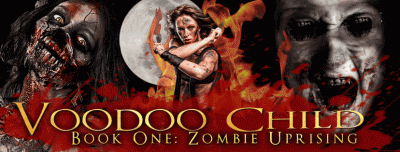
Did any horror movies inspire you to write Voodoo Child?
Oh yeah, more so than books. I guess seeing the original Night of the Living Dead on television as a child really put the fear of zombies in my head. I’m a huge fan of Romero particularly because he creates character driven films. The group dynamics in Night, Dawn, Day and Land of the Dead are what really drive them. I tried to capture that “tribal” feeling in my book by putting disparate characters together and letting them learn from each other and embrace their humanity.
The other major influence was Lucio Fulci’s Zombie (or Zombi 2). I can’t stress enough how important that movie was to me. I loved how Fulci took zombies back to their supernatural roots, incorporating Voodoo beliefs and using a traditional Caribbean setting. I knew that was the world I wanted to create in my book. In fact, in an early draft of Voodoo Child the island was actually called Matul, as opposed to Fantomas. How’s that for geeky?
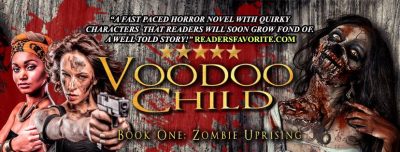
How long did it take you to write Voodoo Child?
Forever, or at least it felt that way. Oddly enough Voodoo Child began as a television concept I was pitching to Cinemax for their late night “Skin-imax” line up. I had already produced three of their steamy series Sin City Diaries, Forbidden Science and Lingerie; that’s probably why I’m not invited into respectable homes. Needless to say, Voodoo Child, or Full Moon Bay as it was called then was a very different project from the book. Unfortunately, Cinemax didn’t finance the show and shortly thereafter canceled their whole After Dark lineup. So those tear-stained pitch documents and pilot scripts went into my “misfit projects” drawer- but Full Moon Bay still called to me in the night… or after dark if you will.
I spent a year doing assignment jobs, mostly ghostwriting paranormal romances involving big girls and werewolves- that’s a thing I guess. Then I decided to turn the Full Moon Bay concept into a novel. It took about six months of writing while balancing my work schedule. During the course of that, I threw away eighty percent of the old concept. I think Sarafina and Rip were the only survivors, though in heavily altered form. I probably spent another eight weeks proofing and tweaking before sending it to a copy editor and proofreader.
For some weird reason part 2 is taking longer than part 1, but I think it’ll be worth the wait.
Does working in the film business help your writing career?
It did in the sense that I wrote episodes of the Cinemax shows, as well as a fun T&A screenplay, all of which got produced. So that was helpful in terms of developing the discipline to sit down and write. But since then the two occupations haven’t intersected much. The film business shows interest when you sell lots of copies, which hasn’t happened… yet.
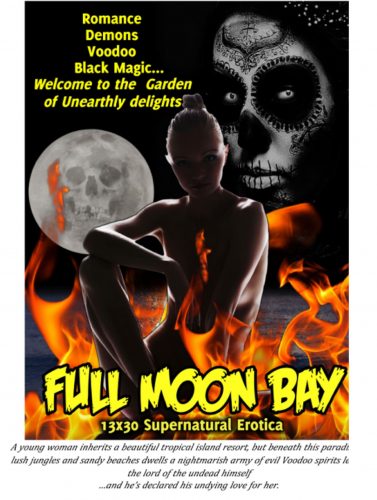
How do you connect with Maggie Child?
I knew going in that I wanted to avoid the horror genre’s habit of creating heroines are either men with breasts who respond to every situation with male bluster, or just overly sexualized stereotypes. Romero films influenced my desire to create an intelligent and capable female lead character who’s thrust into an impossible situation. I think Sarah Bowman in Day of the Dead and Francine Parker in Dawn are great examples. I really admired Romero’s screenplay for the 1990 Night remake where he rebooted Barbara from a catatonic victim to being both the voice of reason and a take-charge survivor.
If there were any aspect of my own life in Maggie it would be her awkward family relationship. Like her character I grew up in a weird new age, metaphysical home lacking structure and boundaries. And, like her, I ran off to join the military in search of some discipline. I probably should have run off to the circus because truth told I was a pretty crappy soldier whereas Maggie rocks.
Maggie’s search for a place to call home also stems from my personal experiences. In one sense Maggie found a perfect home in the army- a place where she could experience camaraderie while tactfully avoiding deep interpersonal relationships, which secretly scare the crap out of her. But when she was shot down, kidnapped and declared dead that safe haven was ripped away. Now fate’s dropped her onto this remote Caribbean island where, for the first time, she’s forming genuine emotional bonds with this eccentric group of people. Her journey is about growing from a stoic, isolated person into a truly great one. As a vagabond who’s lived in seven cities in three countries, I can relate to her search, except for the part about becoming a great person- I’m still working my way up to marginal.
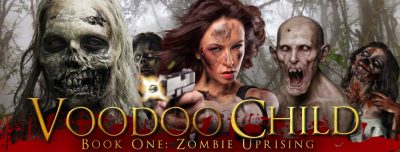
What was the most difficult part of writing Voodoo Child?
One difficult thing was disconnecting myself from my film habit of always thinking about the budget. I caught myself writing on a small scale as if someone was going to have to pay to put it on screen. Once I stopped that it opened up massive possibilities, so the book has chaotic helicopter crashes and grand scale zombie carnage. But I really enjoy writing the more intimate scenes, whether it’s the character interaction or Maggie’s one on one battle with a hook-handed zombie.
The opposite thing happened in terms of technical stuff. When writing a script you can skim past all the technology and just write, “Helicopter goes really fast… vroom!” And the nitty gritty details become somebody else’s problem. On the other hand, a book requires detailed research into things like actual Voodoo, Blackhawk helicopter operations and pilot crash procedures to ensure the reader gets swept up in believable but not tediously detailed action. Maggie’s chopper getting shot down took me days to work out, but The Columbia Review of Books and Film said I really knew my “war and lore,” which made me feel all warm and fuzzy.
The third part was realizing this wasn’t assignment writing and I was free to explore and find my voice and style. That took a while to sink in.
What do you think about the popularity of zombies in pop culture?
They’re ascension to being the go-to monster is understandable because they encapsulate so many basic fears. Romero initially treated them as dehumanized ghouls in Night. Then he recast them as a reflection of our drone like consumer culture in Dawn, proving these monsters offered onion layers of opportunity. Wow, I have a real man-crush on George Romero!
What makes zombies great is that they’re like a funhouse mirror- each person sees something different reflected. For some zombies represent fear of an epidemic that could destroy us. For others it’s a fear of outsiders, living dead terrorists that are already walking among us. Zombies caused by a manmade epidemic can be seen as a consequence of our modern world. Other people fantasize about the morality free post-zombie world where your boss is dead, Master Card never calls and your girlfriend is satisfied just to survive another day; all you have to do is live by your wits and carry a really big assault rifle. It’s kind of the modern equivalent of being a western gunfighter, though I doubt Zane Grey would approve. In short, zombies have become society’s great utility infielder monster.
In the voodoo religion zombies had a different significance. Voodoo was practiced by slaves who didn’t fear death, seeing it instead as their only release from a lifetime of suffering. But if you were turned into a zombie your soul would never find that release and you would spend your remaining life or perhaps eternity toiling in a sugar field as a mindless slave. So zombies have different, but still frightening meaning in every culture.
Of course, you can just think of them as really cool, gross looking monsters that eat people. Shouldn’t that be enough?
What has been your proudest moment before/during or after writing Voodoo Child?
Partially it was the sense of accomplishment in finishing a novel, which is a labor-intensive endeavor that never seems to end.
But I think the best moment was when the positive reviews started coming in, especially the notoriously highbrow Columbia Review of Books and Film, which I was dreading. I was very relieved to get a rave review from them. It wasn’t a feeling of “wow I’m awesome,” (though secretly I am) but rather a sense of relief in knowing I didn’t suck.
What comes next after Voodoo Child, Book One: Zombie Uprising?
Well Voodoo Child, Book Two: Legion of the Dead is the main thing. The first book was written very free form, so even I didn’t know how it would end. In contrast, the second volume has a very detailed fifty-page treatment… and I still don’t know how it ends.
In Legion of the Dead a US Navy Littoral Combat Ship (which are incredible) arrives off the coast to render aid, but it turns into a disaster. Aside from zombies Maggie and Sarafina will be dealing with marines who are convinced they’re psychopaths, crashing aircraft, burning ships, killer drones, schools of man-eating hammerhead sharks and zombies that are starting to organize under Prime Minister Lavonia Dawes’ command.
The research for this one has been intense. Outside of the supernatural and voodoo elements I’ve had to study navy ship diagrams, drone helicopters, marine corps combat operations and even how to make napalm using only home insulation, diesel fuel and cold packs from a first aid kit. My browser history is the stuff of nightmares.
So I’ve ramped up the action even more and it’ll be a wild ride.
What else is William Burke working on?
Well, books have been my main focus, though you wouldn’t know it from my flimsy bibliography. But I’ve also been writing articles and reviews for Horror News, which has been great. Not only do I get a lot of creative latitude from Mike in terms of subject matter but it also gives me a lot of finite pieces to write whenever I’m stricken with writer’s block. It’s kind of like when coaches tell you to “walk it off,” when you’re hurt.
Other than that I really have to fix my roof and paint the front porch. Unfortunately, the average zombie is probably more skilled at home renovation than me.
 Horror News | HNN Official Site | Horror Movies,Trailers, Reviews
Horror News | HNN Official Site | Horror Movies,Trailers, Reviews
